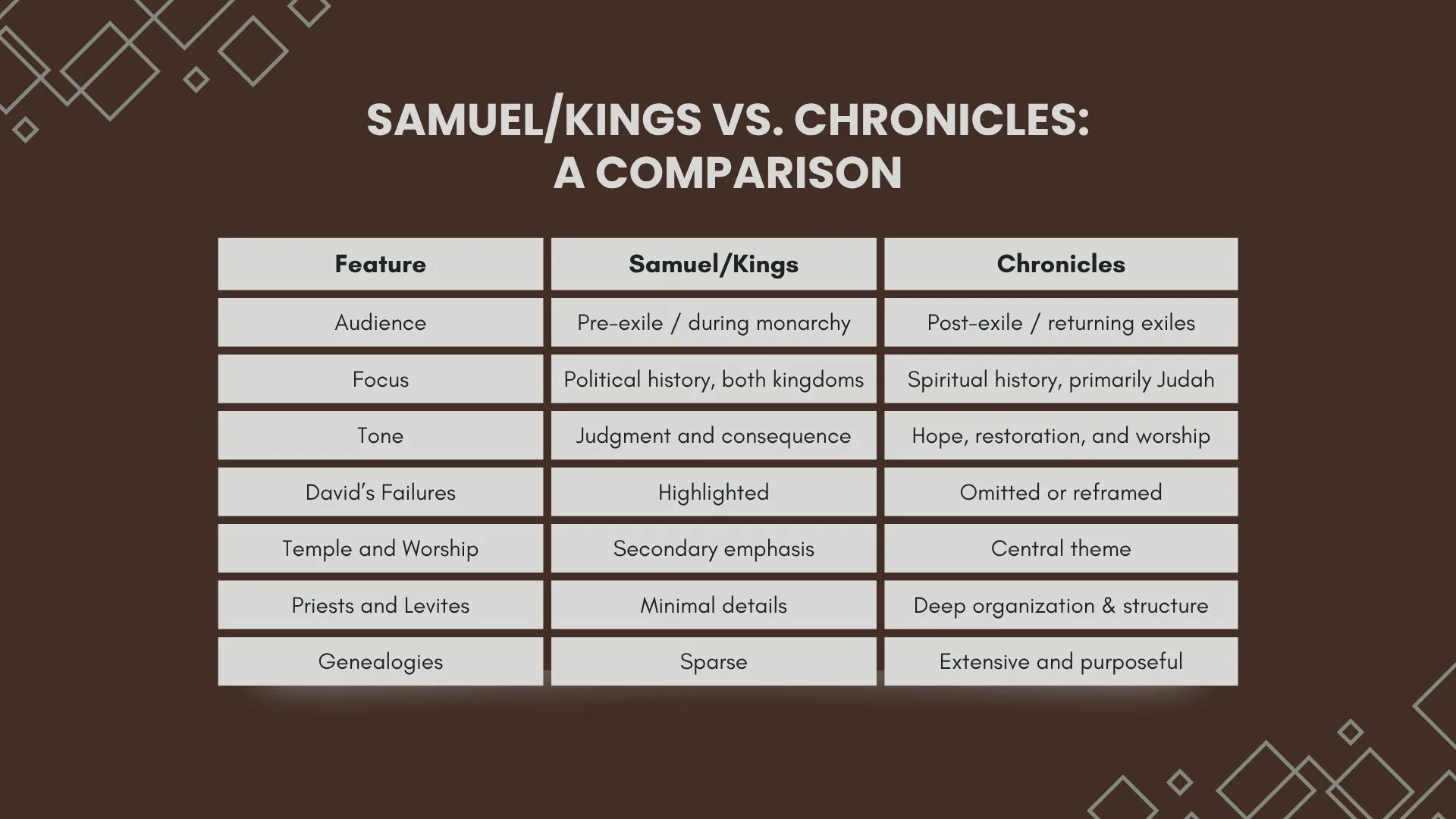Not Just a Repeat: What Makes 1 & 2 Chronicles Different—And Vital
If you’ve ever read through 1 & 2 Samuel and 1 & 2 Kings, then turned the page into 1 & 2 Chronicles, you might have thought: “Wait... didn’t we already read this?”
The short answer is yes—but not like this. Chronicles retells many of the same events, but it reframes them with a very different purpose, perspective, and priority. And that difference is why these books matter deeply for us today.
Why Do We Have a Retelling?
1 & 2 Chronicles were likely written after the Babylonian exile—when Israel had been defeated, their temple destroyed, and their identity shaken. The people who returned to rebuild Jerusalem and the temple needed more than just a historical review.
They needed a reminder of who they were, whose they were, and what they were called to do.
So the Chronicler tells the same stories—but with a new lens. His focus isn’t political history—it’s spiritual formation. Chronicles is like a priest’s commentary on Israel’s past. It leaves out many of the nation’s lowest moments and zooms in on worship, the temple, covenant faithfulness, and spiritual leadership.
What’s Different About Chronicles?
1. A Focus on Hope and Restoration
Where Samuel and Kings show the rise and fall of kings—warts and all—Chronicles leans into the moments of faithfulness. For example, David’s sin with Bathsheba isn’t mentioned. Not because it wasn’t serious, but because the Chronicler wants to highlight what to rebuild, not just what went wrong.
Chronicles isn’t revisionist—it’s redemptive.
2. Centered on Judah and the Temple
Unlike Kings, which bounces between the northern and southern kingdoms, Chronicles almost entirely ignores the north (Israel) and focuses on Judah—the lineage of David and the location of the temple in Jerusalem. This centers the narrative on worship and covenant, not politics or rebellion.
3. Worship, Priests, and the Presence of God
Chronicles pays close attention to the organization of the Levites, the structure of worship, and the preparation for building the temple. This emphasis shows what matters most in the eyes of the Chronicler—and in God’s plan: His presence among His people.
4. Genealogies with a Purpose
The book opens with 9 chapters of genealogies. That’s not accidental—it’s foundational. These records trace God’s faithfulness through generations and connect the returning exiles to their heritage. It’s a reminder that God hasn’t forgotten His people, and their story is still part of His plan. Every now and then in the midst of these lists of descendents and genealogies we will get a short description of a person or something that happened in their life. This is on purpose and it calls us to dig deeper and find out why the writer would mention what he did.
Samuel/Kings vs. Chronicles: A Comparison
Why This Matters for Us Today
Chronicles wasn’t just written for ancient Israel—it was written for anyone who needs to remember who they are in God.
If you’ve ever felt like your story is fractured, your purpose lost, or your identity shaken—Chronicles is for you. It reminds us that even after failure, exile, or loss, God is still faithful to restore.
This isn’t just a retelling—it’s a re-centering around God’s presence and promises.
It also challenges us to ask:
Is worship central to my life?
Am I building something that honors God’s presence?
Am I carrying forward the legacy of faith He’s entrusted to me?
Takeaway: Rebuilding Around God’s Presence
Chronicles calls us to rebuild our lives, our churches, and our communities around the presence of God. Not just knowledge or ritual, but a deep desire to dwell with Him.
Like David preparing for the temple or the Levites organizing worship, we’re invited to treat our faith with intentionality and awe. And just like the Chronicler saw meaning in every name, God sees purpose in every detail of your life.
Final Encouragement
As you read 1 & 2 Chronicles, don’t see it as repetition—see it as restoration. God is still in the business of bringing people back to Himself, reordering broken stories, and building something new through those who are willing.
Chronicles doesn’t erase the past—it reorders it around God’s presence.
So take it slow. Read with worship in mind. And ask God what He’s rebuilding in you.
Looking for an overview on the weekly reading in Chronicles? Check out this video.
What surprised or encouraged you most as you began Chronicles? Share in the comments.

